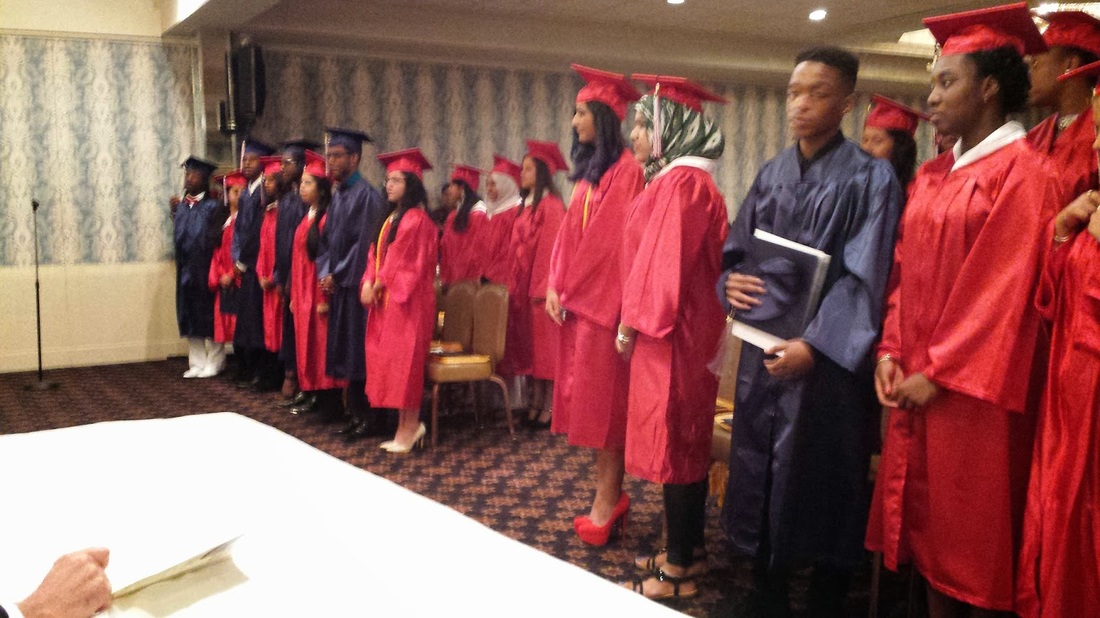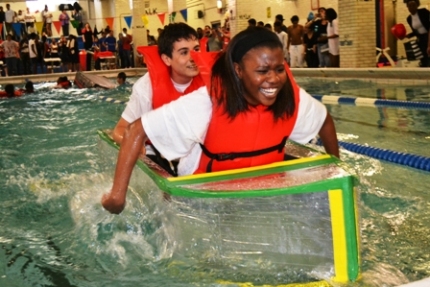 Last Graduation, 2014. Courtesy of: iceuftblog.blotspot.com Last Graduation, 2014. Courtesy of: iceuftblog.blotspot.com The current edition of the New Yorker contains a terrific article by Jelani Cobb about the fate of our mutual alma mater, Jamaica High School in Queens. (Brian Savin notes the article is available on the New Yorker site, so I am showing the link here. Subscribe anyway.) http://www.newyorker.com/magazine/2015/08/31/class-notes-annals-of-education-jelani-cobb Cobb has been working on the article since he sat in my family kitchen for a few hours on a snowy day in February – or perhaps I should say, since his mom made sure he attended Jamaica because of a teacher she respected. That teacher was Herb Sollinger, from a family I have known for many decades -- the bonds to that beautiful building on a hill, bonds that New York City, under Michael Bloomberg and Joel Klein, went out of its way to atomize. The building still stands – built to last forever – and four small schools take the place of the entity known as Jamaica High School. I hope they are doing well -- and I visited a couple of smaller schools in Queens last year that seemed to be excellent. Cobb does a wonderful job detailing the education JHS gave to generations. He also fairly represents the problems, the challenges, the occasional violence, in the new era. But I was in Jamaica High quite a lot in its last generation, as the guest of dedicated teachers and students who reminded me of my era. I visited Josh Cohen’s honors English class, where a young African-American woman quizzed me about freedom-of-information laws. (I tensed up because she knew more about it than I did.) She was a bright light and now works for a union in the city.) Another time I visited Cohen’s class, and a young man with an Islamic name was reading his term paper on “The Crucible” by Arthur Miller. The city tried to scare off students, distributing flyers about violence in the area. Two young women in chadors told me how their parents had transferred them to another old school, but the girls soon told their parents they were getting a better education at Jamaica, and transferred back. Education was happening. Some young people were going on to college. I got to know teachers like Sue Sutera, who held the place together as a teacher, as a coach, as a mensch. When Jamaica High was blown up, there was no institutional memory; she had to scramble to find a job elsewhere. I suspect union-busting as a motivation, also. I’ve written about Jamaica on this web site – just click on the tab for Jamaica High. The subject could not have found a better and fairer journalist than Jelani Cobb. I am a huge fan from watching him on MSNBC and reading him in the New Yorker, as he wrote about Ferguson and Charleston – and now our own high school. I originally did not include the free link out of respect to Cobb and David Remnick, the editor, who has installed new energy and gravitas to a grand institution. I wish New York’s leaders had found the courage and wisdom to do the same for Jamaica High.
Janet Vecsey
8/24/2015 04:11:58 am
Very sad indeed. Where are all the students in that area going? I don't get it. I know how involved you have been, and I'm sure it's difficult to see the end of an era.
George Vecsey
8/24/2015 04:27:28 am
Jane, thanks for noticing. These days in NYC, kids have to be booking agents for themselves. Catchment areas don';t mean anything. Immigrant families have to sort out all these little boutique schools -- do they take a bus for 30 minutes to the school for Restaurant Trades (I made it up) or two buses for 40 minutes to the school for Potential Plumbers. Jamaica, you went, and you found something or did not. But that was where you went. Mom sent me off to Jamaica...that was our big thing in common. Love, G
Josh Rubin
8/25/2015 05:11:25 am
Booking agents, indeed. The options (and pitfalls) of the current processes for students and high schools to find each other are dizzying and require more savvy than should be reasonably expected. Our daughter goes to a selective HS (but not one that uses the specialized exam) and has some friends from lower-income immigrant backgrounds and it is impressive how those kids found her school and knew to apply.
Brian Savin
8/24/2015 01:09:17 pm
I will take the liberty of including it because in an unusual move the New Yorker seems to have made it publicly accessible, as makes sense given its broad public interest nature. Interesting, and complicated.
John
9/1/2015 04:22:24 pm
I agree that the essay is complicated. Have been tempted to ask the author to simplify his summary, as there seems to be a contridiction or two in it. Very thought provoking, which is perhaps, the highest complement.
Brian Savin
8/24/2015 01:27:56 pm
By the way, the author's Principal at Jamaica High, was also my son's in another place and time. She was first rate. See, e.g., http://www.nydailynews.com/archives/news/reading-writing-racism-greenwich-bias-history-article-1.690083 8/24/2015 03:16:57 pm
Another update on the saga of Jamaica High School which should also be of interest to non-alumni.
Andrew Sollinger
8/29/2015 02:12:12 am
George, Thanks for connecting us to Jelani, who did Jamaica proud. His anecdote about my dad - "a brilliant, quirky figure...with an encyclopedic knowledge of world affairs" was spot on. He wore red socks every day so students would want to come to his class - not just because it made him quirky...they wanted to see if he was going to wear the socks again!
George Vecsey
9/2/2015 01:03:21 am
Andrew, a belated thank you for your note. Your dad is a legend to Jelani Cobb and thousands of others. I have driven our kids mad over the years, purposely driving past the school just to show them. Of course, we gravitated to a town where the high school is on the hill. But nothing is as majestic as JHS. I had teachers who had studied Greek and Latin in Depression-era NYC. And brilliant classmates. It was indeed like college. GV Comments are closed.
|
Categories
All
|










